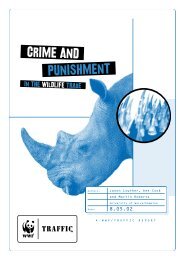In full swing: assessment of trade in orang-utans and ... - WWF UK
In full swing: assessment of trade in orang-utans and ... - WWF UK
In full swing: assessment of trade in orang-utans and ... - WWF UK
You also want an ePaper? Increase the reach of your titles
YUMPU automatically turns print PDFs into web optimized ePapers that Google loves.
CONCLUSIONS AND RECOMMENDATIONS<br />
Dur<strong>in</strong>g the data collection for this <strong>assessment</strong>, a large number <strong>of</strong> people <strong>in</strong>volved <strong>in</strong> monitor<strong>in</strong>g <strong>trade</strong> <strong>and</strong> wildlife law<br />
enforcement were consulted. Dur<strong>in</strong>g these discussions, some gaps <strong>in</strong> the current system were highlighted, as well as a<br />
number <strong>of</strong> unresolved issues.<br />
As such, the follow<strong>in</strong>g conclusions <strong>and</strong> recommendations can be made:<br />
Monitor<strong>in</strong>g <strong>and</strong> data collection<br />
This <strong>assessment</strong> revealed that a significant number <strong>of</strong> gibbons <strong>and</strong> <strong>orang</strong>-<strong>utans</strong> have been <strong>and</strong> cont<strong>in</strong>ue to be <strong>trade</strong>d at<br />
bird markets on Java <strong>and</strong> Bali. Both groups <strong>of</strong> species are less openly displayed than several years ago <strong>and</strong> it appears<br />
that a large proportion <strong>of</strong> the <strong>trade</strong> has gone underground. Wildlife <strong>trade</strong> on Java <strong>and</strong> Bali is capricious with an<br />
ever-chang<strong>in</strong>g dem<strong>and</strong> for species <strong>and</strong> frequent switches from one species to another. This is partially dem<strong>and</strong>-driven<br />
but, at least for some species, also supply-driven. When previously <strong>in</strong>accessible areas are opened up (because <strong>of</strong> l<strong>and</strong>use<br />
changes with, e.g., logg<strong>in</strong>g roads provid<strong>in</strong>g <strong>in</strong>creased access), species that were rarely <strong>trade</strong>d might see an <strong>in</strong>crease<br />
<strong>in</strong> numbers be<strong>in</strong>g caught simply because there are ways to market the animals. There is very little research conducted<br />
on the economics <strong>of</strong> the primate <strong>trade</strong> <strong>in</strong> <strong>In</strong>donesia, especially with reference to the supply end <strong>of</strong> the cha<strong>in</strong>; <strong>and</strong> simple<br />
questions regard<strong>in</strong>g who catches which species, where, <strong>and</strong> why rema<strong>in</strong> as yet unanswered. Similarly, there is<br />
uncerta<strong>in</strong>ty over what forces drive the primate <strong>trade</strong> <strong>and</strong> who receives support <strong>and</strong> back<strong>in</strong>g from which quarters <strong>of</strong><br />
<strong>In</strong>donesian society. Catch<strong>in</strong>g primates may merely be a by-product <strong>of</strong> other activities (e.g. logg<strong>in</strong>g, hunt<strong>in</strong>g), but <strong>in</strong> some<br />
cases it may be an <strong>in</strong>dependently operat<strong>in</strong>g bus<strong>in</strong>ess. These uncerta<strong>in</strong>ties need to be further <strong>in</strong>vestigated, not just on Java<br />
or Bali, but especially so on the major 'source' isl<strong>and</strong>s <strong>of</strong> Sumatra <strong>and</strong> Kalimantan (or other isl<strong>and</strong>s <strong>in</strong> <strong>In</strong>donesia for other<br />
species) <strong>in</strong> order to design <strong>and</strong> implement effective responses to mitigate illegal wildlife <strong>trade</strong>.<br />
Recommendations: NGOs <strong>in</strong>volved <strong>in</strong> halt<strong>in</strong>g illegal wildlife <strong>trade</strong> <strong>in</strong> collaboration with relevant departments <strong>of</strong> the<br />
<strong>In</strong>donesian Government should collect data <strong>in</strong> a systematic manner from a number <strong>of</strong> key wildlife markets <strong>in</strong> the larger<br />
cities (Jakarta, Surabaya, Yogyakarta, Semarang) on a regular basis which ideally would be able to document the species<br />
turnover. Simply tally<strong>in</strong>g the number <strong>of</strong> <strong>in</strong>dividuals on display may be a first step, but <strong>in</strong>-depth studies would be more<br />
valuable, <strong>in</strong>clud<strong>in</strong>g undercover operations to further unravel the <strong>trade</strong> network. To anticipate any changes <strong>in</strong> the volume<br />
or species composition, monitor<strong>in</strong>g effort should not just be restricted to gibbons <strong>and</strong>/or <strong>orang</strong><strong>utans</strong>, but <strong>in</strong>clude a<br />
variety <strong>of</strong> species. Any personnel, whether Government staff or NGO researcher, <strong>in</strong>volved <strong>in</strong> monitor<strong>in</strong>g need to have<br />
adequate skills <strong>in</strong> identify<strong>in</strong>g the species <strong>of</strong> <strong>in</strong>terest. Current levels <strong>of</strong> monitor<strong>in</strong>g have been sufficient to obta<strong>in</strong> the<br />
general pattern <strong>of</strong> what species were <strong>trade</strong>d <strong>and</strong> <strong>in</strong> what volumes, but many questions rema<strong>in</strong> to be answered. The<br />
availability <strong>and</strong> consistency <strong>of</strong> data needs to be improved <strong>and</strong> a regular <strong>and</strong> well-designed monitor<strong>in</strong>g scheme may reveal<br />
temporal changes far better than has been currently possible <strong>and</strong> allow for subsequent actions to be taken.<br />
Besides the bird markets, a more str<strong>in</strong>gent monitor<strong>in</strong>g by <strong>In</strong>donesian Government agencies <strong>of</strong> the major ports is<br />
recommended. Aga<strong>in</strong>, it needs to be assessed whether or not primate <strong>trade</strong>rs operate <strong>in</strong>dependently or if they are <strong>full</strong>y<br />
embedded <strong>in</strong> other bus<strong>in</strong>esses (e.g., timber <strong>trade</strong>), as has been suggested.<br />
Awareness <strong>and</strong> education<br />
Among the general public on Java <strong>and</strong> Bali there is limited awareness about the <strong>in</strong>tr<strong>in</strong>sic value <strong>of</strong> wildlife, <strong>and</strong> there is<br />
little underst<strong>and</strong><strong>in</strong>g about the impact <strong>of</strong> <strong>trade</strong> on protected species. The <strong>in</strong>cidence <strong>of</strong> capture <strong>of</strong> <strong>orang</strong>-<strong>utans</strong> <strong>and</strong> gibbons<br />
from the wild populations <strong>in</strong> Java, Sumatra <strong>and</strong> Borneo (Kalimantan) may be significantly reduced through <strong>in</strong>tegrated<br />
IN FULL SWING:ASSESSMENT OF TRADE IN ORANGUTANS AND GIBBONS ON JAVA AND BALI,INDONESIA 38


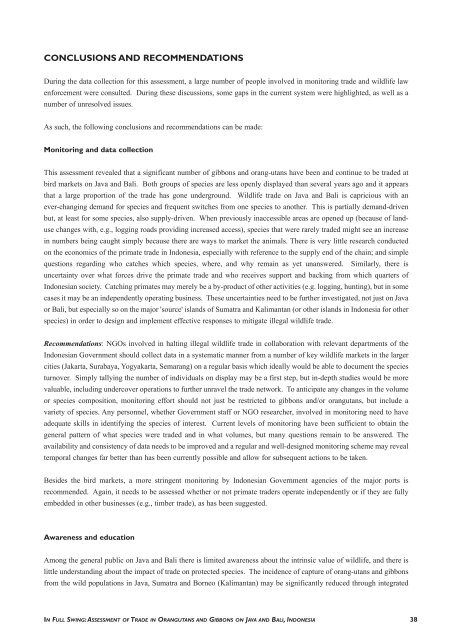
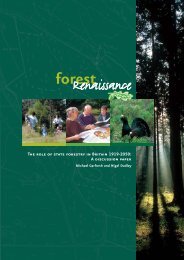
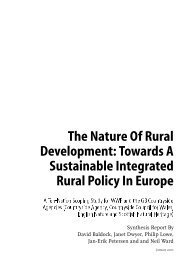
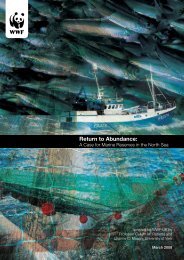

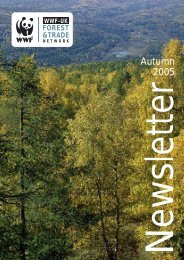
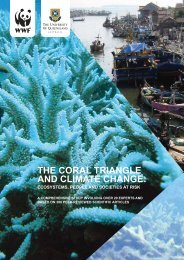
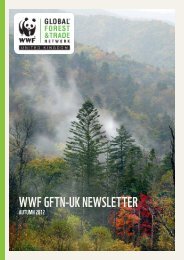
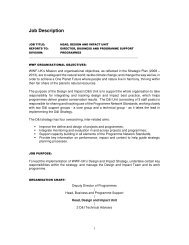
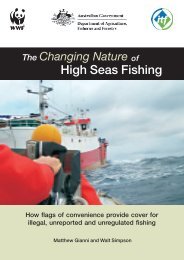
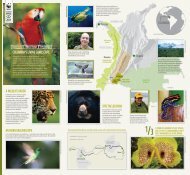
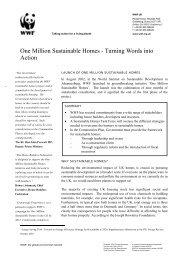
![[PDF] Causes for concern: chemicals and wildlife - WWF UK](https://img.yumpu.com/31929970/1/184x260/pdf-causes-for-concern-chemicals-and-wildlife-wwf-uk.jpg?quality=85)
